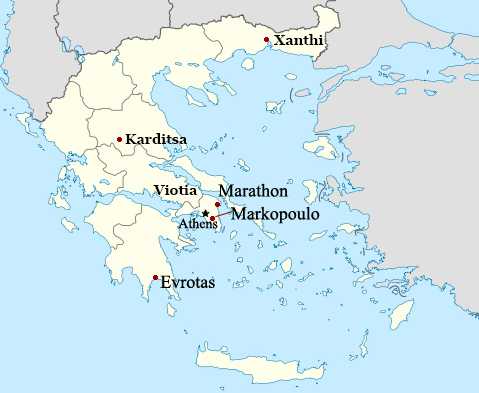Malaria Cases: Greece Update, December 21, 2012

A map of Greece showing the locations of Athens, Evrotas, Karditsa, Markopoulo, Marathon, Viotia region, and Xanthi.
The Centers for Disease Control and Prevention (CDC) has received information that there have been five additional Plasmodium vivax malaria cases identified in Greece; one case in a Greek resident with no previous travel, and four cases in immigrants. Between January 1 and December 1, 2012, Greece has reported a total of 83 cases of malaria. Of those cases, 52 were caused by P. vivax (17 are locally acquired, 2 are relapses, and the remainder occurred in immigrants). The immigrants reported being in Greece from as short as a few days before onset of symptoms to as long as 5 years before the onset of symptoms, therefore these cases could have been either locally transmitted or imported.
The one new case in a Greek citizen with no previous travel occurred in Evrotas (Lakonia) where a cluster of locally-transitted cases has been previously identified.
No new cases have been reported in Markopoulo, Marathon, Xanthi, Viotia, and Karditsa; areas that previously had locally-transmitted cases. No locally transmitted malaria cases have been reported in Athens.
The Hellenic CDC continues to work with the European CDC and has responded with enhanced surveillance, targeted testing and treating among migrants, and vector control activities. In current- and previously affected- areas healthcare providers have been educated about early malaria diagnosis and treatment, and the public has been informed about the symptoms of malaria and the prevention of mosquito bites.
With the currently low winter temperatures, the transmission season is likely at an end. No malaria chemoprophylaxis is currently recommended for travel to Greece. The warmer temperatures in the spring can be expected to bring increased mosquito activity at which time the malaria situation will be reassessed.
See the CDC Malaria website for additional health information about malaria. For general health information for travelers to all areas of the world, see the CDC Traveler's Health website.
- Page last reviewed: March 11, 2016
- Page last updated: March 11, 2016
- Content source:


 ShareCompartir
ShareCompartir